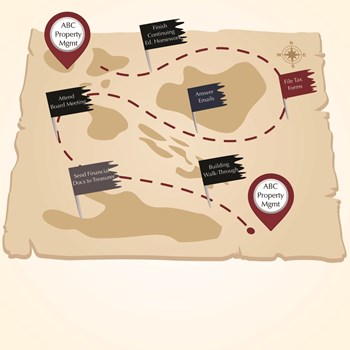
No matter what the size of their portfolio, a property manager must wear a great many professional hats: human resources pro, administrator, mediator, organizer, social director, project manager, sounding board—sometimes even therapist.
If a water pipe bursts, and water pours from one unit to the other downstairs, the property manager gets the call. Same thing happens when the punk rock guy in 7B decides to hold a band rehearsal in his apartment until midnight, or the opera singing tenant in 6A is practicing her scales ad infinitum. The best managers are the ones who juggle all these functions behind the scenes, quietly getting the job done without a lot of fuss or drama. Put another way, the best managers are miracle workers.
Absolutely No Absolutes
If there’s one absolute about a day in the life of a property manager, it’s that there are no absolutes. Every day is different.
“It runs the gamut,” says Doug Weinstein, director of operations for AKAM Associates, Inc., in New York City. “It is never the same day to day. There are all sorts of preventative maintenance to keep up on and capital projects to manage. I go to job sites and meet with the contractors and engineers.” There are enough things to do that the days do not repeat.
“One of the nicest things about my job is that every day is different,” says Steven Birbach, president and CEO of Vanderbilt Property Mgmt. LLC in Glenwood Landing, New York. “You might wake up to a leak or a fire or a plumbing issue—every day is unique. The plan can deviate very quickly due to circumstances. I’m very involved and I oversee each and every property, good or bad. It’s meeting contractors, board meetings, union issues.”
“Every day is different,” says Lori Kenyon, CMCA, PCAM, vice president of management services at Signature Property Group in Englewood Cliffs, New Jersey. “You never know what’s going to hit you. We should write a book; some of the things that happen are crazy.”
Despite the potential for unforeseeable outcomes, the days do have something in common. “The average day consists of returning emails, phone calls, inspections, what have you,” says Kenyon. It is from these emails and phone calls and inspections that the crises may arise.
“The first thing I do is check in with the building staff to see what happened overnight,” says Weinstein. “I need to know if there are any mechanical or physical plant issues. Sometimes I will walk around the building. I'll deal with any sort of resident issues. Sometimes it can be as mundane as questions on a bill, while other times it's ongoing leaks.”
From there, things can get pretty crazy pretty quickly.
“This is not only a service business because you are dealing with people’s most prized possession: their home,” says Weinstein. “You may receive calls that a leak damaged someone’s entire art collection or kids’ school work. This may be their most intimate possessions and largest investment. I have been in this business for 30 years, and I always find something new about something.”
The round-the-clock aspect is central to the job, and the best property managers relish the challenge that this poses. “This is not a desk job or a 9-to-5 job,” says Weinstein, “and that’s what makes it exciting.”
Birbach agrees. “There are so many things to do at each property multiplied by number of properties and it doesn’t stop at 5 p.m. You need to be available and accessible 24/7 to deal with problems. It doesn’t stop. It can be for a fire or boiler issues to no hot water and no electric. Just one thing after another. And that’s what I love about it. It’s a great industry if you don’t ever want to be bored.”
A Special Blend
The best property managers share certain characteristics: excellent communication skills, the ability to stay organized, broad knowledge of the issues that may arise, and a the satisfaction that comes with helping people. “The biggest thing is caring about what you’re doing,” says Kenyon. “It is also important to be conscientious.”
Property managers tend not to be specialists, but rather generalists. Kenyon is typical in this sense. “I am a jack-of-all trades and I know a little about a lot of different things.”
“In order to be an effective property manager, one has to have great interpersonal skills,” adds Birbach. “One should also be a good listener, and you can’t be uncomfortable voicing professional opinions and recommendations. Sometimes it's imperative to inform your boards of the right way to do things versus the wrong way. This comes with experience in the business. For example, we may be getting bids for a new elevator. While the low bidder is more attractive, I’ve been in the business for 35 years, and I may not know the low bidder, so I don’t recommend them. The board is going to choose who they want and assume that they are a quality company, but I don’t know if the company will send someone in the middle of the night if the power is out.”
Another trait: staying on top of situations before they spiral out of control. “The more proactive I am, the less reactive I need to be,” says Weinstein. “Preventative maintenance systems cause fewer breakdowns, enabling me to be less reactive. That extends to physical plant issues, and to communicating with residents. Communicating with residents and boards is key. I think of a building as a vertical village. When there are so many people under one roof, miscommunication may occur. This could be a group email, or at a meeting, or a myriad of different things. More communicating with residents equals fewer problems. I like dealing with a single resident as opposed to a group. This way I can assure the individual that if there is an issue, I am working on it and communicating in a timely manner.”
Indeed, communication may well be the most critical part of the job. You have to impart knowledge and wisdom without sounding like a know-it-all, you have to establish a precedent for telling it like it is, and you have to make everyone—the board, the super, the residents—feel like they are being heard.
“People are the priority,” says Kenyon. “If you can make that person feel like they are a priority, you have done a good job. I try to establish that dynamic on a daily basis, because every day is different—you never know what is going to hit you.”
When Things Get Real
Sometimes what hits you is bad. Property managers can take the brunt of anger from disgruntled residents, for example. Or just impatient ones.
“I think the big thing is that we’re not able to perform magic,” Kenyon says. “We can only work with what we have. As managers, we are restricted by the budgetary restraints and governing documents of associations, so obstacles that may seem simple are not so easy to overcome. There is a process that needs to be followed—we can’t just snap our fingers and make things happen in an instant. Many of our issues stem from technology making things instantly available by phone and computers. I drop my daughter at school and order breakfast from Panera on my phone, so that when I get there, all I have to do is pick it up. People think property management is like that. I try to educate people. If the roof is leaking and it is raining, the roofer can’t fix it while it is still raining because it has to be a dry repair, and because it's dangerous for the roofer. I’ve been doing this for 30 years, and things like this can’t happen that quickly.”
Birbach has had similar experiences. “Sometimes I’ll receive an email at 9 p.m. from a tenant who will expect a response that night. After-hours should be for emergencies but some residents don’t realize that.”
“Property managers are very professional in what we do, and hope all of our constituents appreciate and respect that,” Weinstein says. “Sometimes when dealing with people’s homes, emotion governs instead of logic. We strive to do the best job we can, but you may not get the answer you want to hear all the time.” Because they are responsible for so much, the buck always stops with them. They take the blame when things go south.
In the final analysis, “Patience and perseverance is key to being a successful property manager,” says Weinstein. “You have to have thick skin.”
Greg Olear is a freelance writer and a frequent contributor to The New Jersey Cooperator.






Leave a Comment